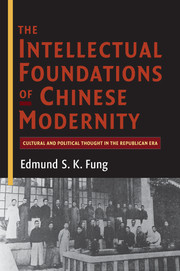 The Intellectual Foundations of Chinese Modernity
The Intellectual Foundations of Chinese Modernity Book contents
- Frontmatter
- Contents
- Acknowledgements
- Abbreviations
- A Note on Romanization
- Introduction
- 1 The Push of Westernized Radicalism
- 2 The Pull of Cultural Conservatism
- 3 The Politics of Modern Chinese Conservatism
- 4 Liberalism in China and Chinese Liberal Thought
- 5 The State, Government and the Rule of Law
- 6 The Rise of Reformist Socialist Thought
- 7 From State Socialism to Social Democracy
- Conclusion
- Glossary
- Selected Bibliography
- Index
- References
2 - The Pull of Cultural Conservatism
Published online by Cambridge University Press: 03 May 2010
- Frontmatter
- Contents
- Acknowledgements
- Abbreviations
- A Note on Romanization
- Introduction
- 1 The Push of Westernized Radicalism
- 2 The Pull of Cultural Conservatism
- 3 The Politics of Modern Chinese Conservatism
- 4 Liberalism in China and Chinese Liberal Thought
- 5 The State, Government and the Rule of Law
- 6 The Rise of Reformist Socialist Thought
- 7 From State Socialism to Social Democracy
- Conclusion
- Glossary
- Selected Bibliography
- Index
- References
Summary
Cultural conservatism stood opposed to cultural radicalism, yet the two were in more of a dialectical than an antithetical relationship. To understand this relationship, it is necessary to begin with a clarification of the term ‘cultural conservatism’. Yü Ying-shih uses the term to denote an attitude or inclination towards maintaining the cultural status quo. In line with his view on the progressive ‘radicalization of China’ in the twentieth century, Yü sees an excess of radicalism culminating in the Cultural Revolution. He laments that conservatism was too weak as a restraint and counterforce, adding that throughout the century there were no true conservatives in China, only varying degrees of reformism and radicalism.
Yü's view has been challenged by the PRC writer Jiang Yihua, who, drawing on the work of the British conservative Hugh Cecil (1869–1956), argues that conservatism meant not opposition to change but ‘change within a defined scope and within a specific framework of value orientation that respects tradition, authority and nationalism’. Jiang finds conservatism in twentieth-century China too strong and too enduring and blames it for China's failure to resolve its myriad problems. On the other hand, radicalism was rather weak in terms of its capacity to establish new economic, political, social and cultural categories and structures for change. The Cultural Revolution was not the culmination of radicalism but the result of ‘an inherited poison of feudal despotic thought and politics’.
- Type
- Chapter
- Information
- The Intellectual Foundations of Chinese ModernityCultural and Political Thought in the Republican Era, pp. 61 - 95Publisher: Cambridge University PressPrint publication year: 2010


